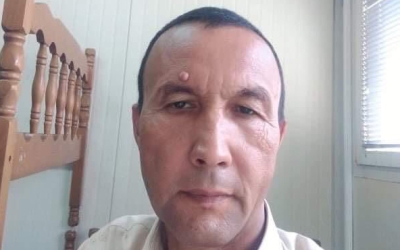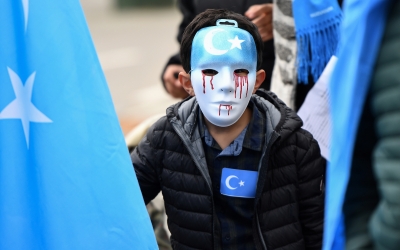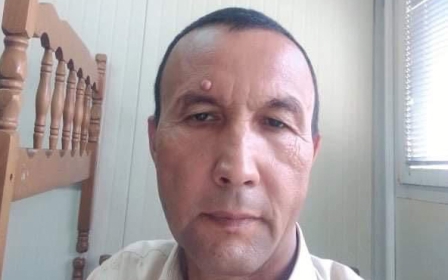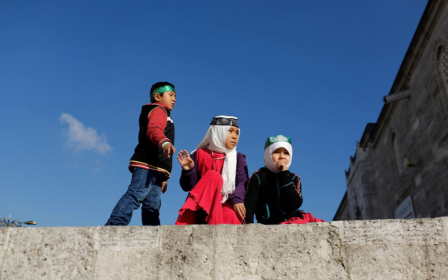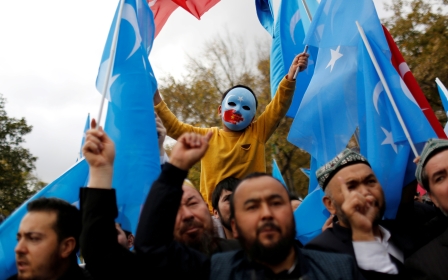Uighur man threatened with deportation to China 'safely en route' to US
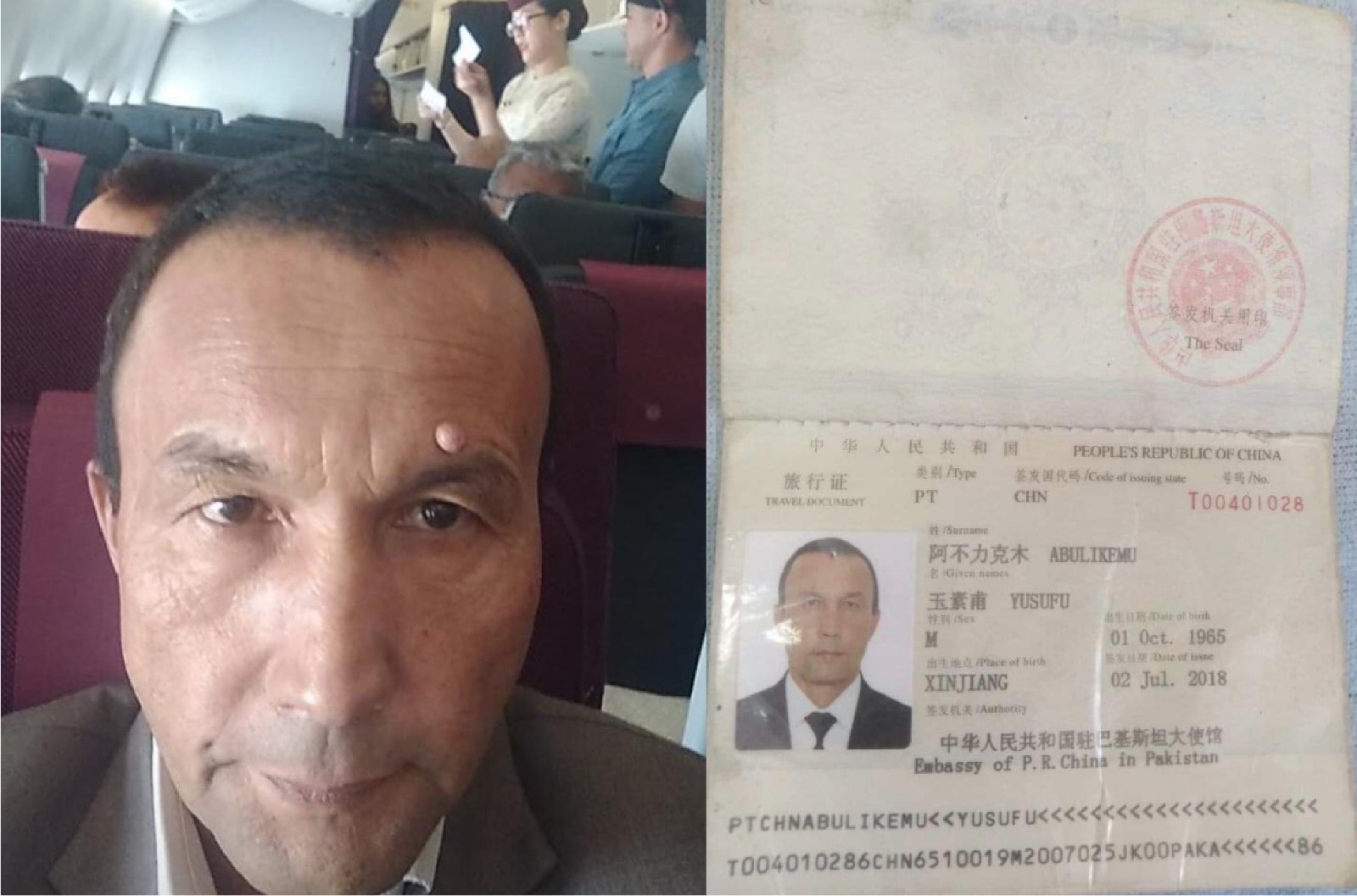
Ablikim Yusuf, 53, said he fled China to escape the authorities' persecution of Uighurs in the country's western Xinjiang region.
A US State Department spokesperson confirmed to Middle East Eye on Tuesday that Yusuf was "safely en route" to the US, but could not comment further due to privacy laws.
Non-US citizens can be granted a special visa known as parole, which allows them to come into the country temporarily.
"The United States is alarmed by China's highly repressive campaign against Uighurs, ethnic Kazakhs, Kyrgyz, and other Muslims in Xinjiang," the spokesperson told MEE in an emailed statement.
"The Chinese government has, by our estimates, detained more than one million individuals since April 2017."
Yusuf had been stranded at Hamad International Airport in Doha since 3 August, when he refused to board a flight to China.
He was deported from Bosnia to the Qatari capital earlier that day.
Pictures posted online on Tuesday showed Yusuf boarding a Qatar Airways flight en route to Washington, DC. He is expected to arrive in the US capital on Tuesday afternoon.
Kimberly Motley, a lawyer representing Yusuf in the US, said he would "likely be" seeking asylum in the country.
"If Ablikim Yusuf is deported to China, then I believe he will be likely to face persecution and imprisonment because of his religious beliefs," Motley told Middle East Eye.
American immigration laws allow individuals to seek asylum if they are facing persecution in their home country on the basis of race, religion, nationality or political views.
Over the weekend, activists from around the world had appealed to the Qatari authorities to grant Yusuf asylum and not send him to China, where they said he could face "imprisonment, torture, and possibly even death".
His case attracted widespread attention online after he posted a video on Facebook from Doha airport on Saturday pleading for help.
Travel documents posted online showed that he had been issued a Chinese travel document from its embassy in Pakistan. He was deported from Pakistan to Bosnia, before being then sent to Qatar.
"I am currently being held at Doha airport ... They are preparing for me to leave. I need the world's help. I am originally from Hotan," said Yusuf, referring to an area in Xinjiang province, in the video he posted on Facebook.
Yusuf also said he had been given a guard to protect him in Doha airport after officials from the Chinese embassy in Qatar attempted to meet him.
Protest in Washington
After Yusuf posted the video online, Uighur groups in Washington protested outside the State Department building in the capital, demanding that the US government intervene.
Tahir Imin, a founding member of online news site the Uighur Times, was one of the activists who helped lobby the State Department to help Yusuf.
'Ablikim was in danger and needed to be somewhere safe. That is why we had to act'
- Tahir Imin, Uighur activist in the United States
Imin fled to the US in 2017 after the Chinese authorities threatened to extradite him to China from Israel.
He said he has been unable to contact his wife and eight-year-old daughter in Xinjiang since he sought asylum in the US.
"We know so many Uighurs who are in the same position as Ablikim and [are] being deported to China. Ablikim was in danger and needed to be somewhere safe. That is why we had to act," Imin told MEE.
The activist said many countries were involved in securing Yusuf's US visa.
"This episode has shown that the United States and its allies are the only countries who can stand up against Chinese oppression on the world stage," Imin said.
Global attention
Human rights groups have condemned China for its mistreatment of the mostly Muslim minority group, as hundreds of thousands of Uighurs are detained in camps across Xinjiang province.
Beijing calls the camps "vocational training schools" and says they have been set up to tackle "religious extremism".
Arslan Hidayat, a Uighur activist born in Australia and now based in Turkey, was in regular contact with Yusuf after he posted his video at the airport in Doha. Hidayat helped translate and put English-language subtitles on the video.
Yusuf is one of the few Uighurs who has been saved from extradition to China, Hidayat said.
"This could possibly be the first case of a Uighur that has gone global, and reminds me of the Save Rahaf campaign," he said, referring to the case of a Saudi woman who was stranded in Thailand after she refused to be sent back to Saudi Arabia.
"We would not have saved Ablikim without the coverage and pressure Uighurs across the world put on global powers to act," Hidayat said.
Like other Uighurs, Hidayat said he has relatives who have gone missing in China.
He said he fears that his father-in-law Adil Mijit, a prominent Uighur cultural figure, has been taken to the "re-education" camps.
"When I made the subtitled video of Ablikim, I was thinking of my father-in-law. He is of a similar age to Ablikim and by saving him, I think I was subconsciously trying to save my father-in-law," said Hidayat.
Lack of action
Despite the attention Yusuf's case has garnered, Uighur activists have decried a lack of concrete action internationally to hold China accountable for rights abuses against members of their community.
Several Muslim-majority countries have remained silent in the face of human rights reports detailing the plight of the Uighurs, while others have appeared to endorse the Chinese government's policies.
In February, Saudi Crown Prince Mohammed bin Salman said China "has the right to take anti-terrorism and de-extremisation measures to safeguard national security", the country's state-run CCTV reported at the time.
That parrots Beijing's argument that the "re-education camps" are a means of stamping out religious extremism.
Last month, Saudi Arabia was also joined by Qatar, the United Arab Emirates, Bahrain, Kuwait and Oman in signing a letter to the United Nations in support of China's policies in Xinjiang.
The letter said that China had restored security in the region while safeguarding the human rights of its residents, Reuters reported.
"Faced with the grave challenge of terrorism and extremism, China has undertaken a series of counter-terrorism and deradicalisation measures in Xinjiang, including setting up vocational education and training centres," Reuters quoted the letter as saying.
Middle East Eye also reported in late July that Turkey had issued deportation papers to several Uighur refugees living in the country.
However, Ankara subsequently said that no Uighurs had or would be deported to China.
Middle East Eye propose une couverture et une analyse indépendantes et incomparables du Moyen-Orient, de l’Afrique du Nord et d’autres régions du monde. Pour en savoir plus sur la reprise de ce contenu et les frais qui s’appliquent, veuillez remplir ce formulaire [en anglais]. Pour en savoir plus sur MEE, cliquez ici [en anglais].


